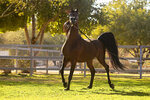

One of the oldest horse breeds in the world, Arabians have been favored companions to riders worldwide since ancient times. The breed captivated Rose City Arabians owners, Joe and Kim Orr, and they began breeding them in Ridgefield in 1984.
Since the beginning, Rose City Arabians has aimed to breed beautiful, calm horses that can be used for riding and competition. The Orr’s ultimate dream is to create the world’s greatest broodmare band, founded on the genetics of championship-winning Arabians.
Joe Orr saw his first Arabian while boarding his quarter horses. He said he was fascinated as he watched a trainer work an Arabian, and he asked if he could purchase one and have them trained as well.
“The Arabian horse mesmerized me,” Orr said. “It just seemed to have more personality and more connection.”
Arabian horses have a unique appearance, unlike any other breed. Their chiseled heads, dish-shaped faces, long, arching necks and high tail carriage are their predominant traits, according to the Arabian Horse Association.
The breed’s long history originates in the Arabian peninsula. The Bedouins bred them as war mounts. The breed was well suited for the harsh desert environment with their large lung capacity and great endurance, according to the Arabian Horse Association.
Ancient Arabians are the ancestors of many different horse breeds, as reported by the Arabian Horse Association. Popular modern breeds, such as the thoroughbred, Orloff trotter, Percheron and Morgan are linked with Arabian genetics.
Though a historically important breed, the Arabian remains popular today. They make excellent companion horses and are adaptable enough to meet their rider’s needs, Orr said. They thrive on social interaction with other horses and humans. Their intelligence, loyalty and sociability make them trainable for many riding disciplines.
“They have this pride of presence, and they’re just good at everything,” Orr said. “You can do it all with them.”
Many Arabian breeders seek to create hot-blooded horses, with high-strung and anxious personalities, Orr said. A “hot” Arabian prances showily, rearing up on their back legs and striking the air with their hooves.
“That scares me,” Orr said. “I don’t think horses would be that way naturally. I think the people make them that way.”
Instead of breeding hot-blooded Arabians, Rose City Arabians produces horses with calm demeanors. Orr said they perform a “grandkid test” with each of their potential breeding horses to ensure the animal meets their temperament standard.
“If our grandkids can go in the stall and walk around the horses and lead them around, they can stay,” Orr said. “What we’re breeding for is not only the perfect balance in beauty but also for that good-thinking mind you can take on a trail ride and complete long-distance rides.”
Rose City Arabians brings horses with excellent genetics from across the world for its breeding program. Some of their best horses, such as stallion Aria Rakeem and mare Jasminia AS, have won multiple championships. Their ranch is breeding the top 1% of horses, Orr said.
Breeding Arabians comes with special challenges. According to the World Arabian Horse Organization, the breed is susceptible to four deadly but preventable genetic disorders: severe combined immunodeficiency disorder, cerebellar abiotrophy, lavender foal syndrome and occipital atlanto-axial malformation. Genetic testing can be performed on the sire and dam to guarantee a safe pairing, resulting in a healthy foal.
An exciting future awaits Rose City Arabians as new foals are born at the ranch. The successful foaling of Joie de Vie Rose, the progeny of Aria Rakeem and Jasminia AS, has sparked exciting new prospects for Rose City Arabians. Jasminia AS was allowed to carry Joie de Vie Rose, though the pregnancy was risky for Jasminia AS.
“Everyone was scared to death when I let Jasminia carry,” Orr said.
In the future, the Orrs look forward to more competitions and plan to breed their mares rather than using a recipient mare as a surrogate. Surrogate mares are used to negate pregnancy risks to a championship dam.
“I know it’s scary, especially when we have a world champion mare,” Orr said. “It’s more natural, and it’ll slow us down a little bit on our breeding.”
For more information about Rose City Arabians, visit rosecityarabians.com, or call Joe Orr at 360-798-6727. The ranch is open by appointment to visitors.